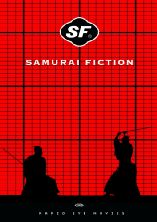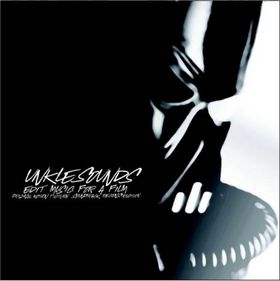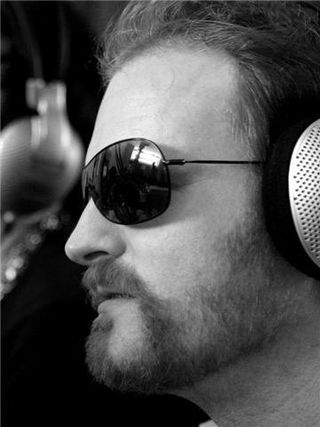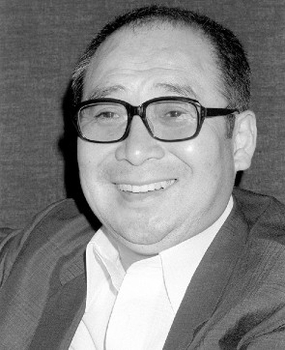
Tomoyasu Hotei, also known simply as Hotei, is a Japanese musician, singer-songwriter, composer, record producer and actor. With a career spanning more than 40 years, Hotei claims record sales of over 40 million copies and has collaborated with acclaimed artists from around the world. Hotei first rose to prominence in the 1980s as the guitarist for Boøwy, one of Japan's most popular rock bands, before starting a solo career.

Samurai Fiction is a 1998 comedy-samurai film directed by Hiroyuki Nakano. It is almost entirely black-and-white, and follows a fairly standard plotline for a comedy and jidaigeki samurai film, but the presence of Tomoyasu Hotei's rock-and-roll soundtrack separates it from the films it was inspired by, such as the works of Akira Kurosawa. A loose spinoff was released in 2001, as Red Shadow.
Schaft is a Japanese musical side project whose main members are Maki Fujii and Hisashi Imai. Schaft can be thought of as being a supergroup in that for the release of their debut album Switchblade Maki and Imai formed the core of the group and a rotating roster of collaborators, who are well known within their genres, were brought in to work on various songs. Raymond Watts of PIG was Schaft's most recurring collaborator, having contributed to half the songs on their debut album and toured with the band. After a long hiatus, Schaft resumed activities in 2015.

After Service is the second live album by Yellow Magic Orchestra, directly following their final studio album, Service. The album features former ABC member David Palmer on additional drums. A film version was released alongside the album. After Service features "Kageki na Shukujo", which was released in a studio version as a single, but does not feature on any of their albums.

Edit Music for a Film: Original Motion Picture Soundtrack Reconstruction is a two-disc UNKLE remix album/sound collection mixing together various musical styles, movie soundbites and UNKLE production. This was done for the 'After Dark' event in the ICA, London. James Lavelle put together a mix of soundtracks from films that inspired him the most. As the album notes point out: 2001: A Space Odyssey, Dune, Dog Day Afternoon, Kill Bill, Sexy Beast, Training Day, and Blade Runner amongst others.

Arena is the sixth studio album by British rock band Asia, released in March 1996 by Bullet Proof Records. Recorded at Electric Palace Studios in London during 1995, it was produced by vocalist John Payne and keyboard player Geoff Downes. The album was a departure from Asia's usual sound, adopting a more acoustic production style with Latin and Middle Eastern influences.
"Battle Without Honor or Humanity" (バトル・ウィズアウト・オナー・オア・ヒューマニティー) is an instrumental music piece by Japanese rock musician Tomoyasu Hotei. It was originally featured in the 2000 film New Battles Without Honor and Humanity by Junji Sakamoto, for which Hotei wrote the soundtrack and also stars in as an actor.

Miles Davis at Fillmore is a 1970 live album by jazz trumpeter Miles Davis and band, recorded at the Fillmore East, New York City on four consecutive days, June 17 through June 20, 1970, originally released as a double vinyl LP. The performances featured the double keyboard set-up Davis toured with for a few months, with Keith Jarrett and Chick Corea playing electronic organ and Fender Rhodes electric piano, respectively. The group opened for Laura Nyro at these performances.

Casiopea World Live '88 is the fifth live album released by the jazz fusion group Casiopea in 1988. It is a compilation Album consisting of recordings of some of their songs played in concert during Casiopea's World Tour in 1988 that promoted their previous album "Euphony". It is also a collaboration album with two Japanese horn sections from two other bands, the brass section of "Spectrum" and the brass Section of "The Tops". Additionally, it is the first album Spectrum recorded since their breakup in 1981, and is their penultimate album. Lead trumpeter/vocalist of Spectrum, Ichiro Nitta, was also the Producer of "The Tops" at the time this album was released. Tops released one more album, "Soul Children", the following year, before they disbanded in 1991. This was also the last album to feature Tetsuo Sakurai on Bass and Akira Jimbo on Drums, who both left to form the band Jimsaku.

Singles Collection is a compilation album by The Coral, released on 15 September 2008 in the United Kingdom on the Deltasonic label. It featured a new song "Being Somebody Else", which was released as a single on 8 September 2008.

Ojos Negros is the sixth studio album by Spanish duo Azúcar Moreno, released on Sony-Epic in 1992. The album's title translates as Dark Eyes and is a reference to one of the tracks included, the Chilean folk tune "Yo Vendo Unos Ojos Negros".
Kosuke Saito, also known as kors k, is a Japanese DJ and music game composer. He is best known for his work in the Bemani series made by Konami. He has produced music under a number of different aliases, such as kors k, Eagle, StripE, and teranoid.

Howard Gray is an English musician, sound engineer, programmer, composer, re-mixer and producer who has worked with Public Image Ltd, Orchestral Manoeuvres in the Dark, Kirsty MacColl, the Armoury Show, the Pale Fountains, Japan, the Stranglers, Simple Minds, the Pretenders, XTC, UB40, Scritti Politti, Cherubs, Terence Trent D'Arby, Jean Michel Jarre, the Cure, Manic Street Preachers, U2, Puff Daddy & Jimmy Page, Tom Jones and Van Morrison.

Body Talk is a 1973 studio album by American guitarist George Benson, released on CTI Records.

New Battles Without Honor and Humanity, also known as Another Battle, is a 2000 Japanese yakuza film directed by Junji Sakamoto. It is a remake of Kinji Fukasaku's Battles Without Honor and Humanity series from the 1970s, which were adapted from a series of newspaper articles by journalist Kōichi Iiboshi, that were rewrites of a manuscript originally written by real-life yakuza Kōzō Minō while he was in prison.

Nobuo Kaneko was a Japanese actor. His wife was actress Yatsuko Tanami. He appeared in more than 200 films between 1946 and 1993.

There Comes a Time is an album by the jazz composer, arranger, conductor and pianist Gil Evans, recorded in 1975 and performed by Evans with an orchestra featuring David Sanborn, Howard Johnson, Billy Harper and Ryo Kawasaki. The album was re-released with an altered tracklist on CD in 1988.

I Am Not Afraid is the sixteenth studio album by South African trumpeter Hugh Masekela. It was recorded in Los Angeles and released in 1974. Tracks 2 and 7 were also included in the 2004 album Still Grazing.

The Skellington Chronicles is the tenth solo album by Julian Cope, released in June 1993 on Cope's own Ma-Gog label. It contains the previously released 1989 album Skellington and its sequel Skellington 2, released here for the first time. Skellington 2 was, like its predecessor, recorded in just two days on April 21–22, 1993.

Guardian of the Light is the seventeenth studio album by American keyboardist and record producer George Duke. It was released in 1983 through Epic Records. Recording sessions for the album took place in Los Angeles at The Complex, Le Gonks West and Ocean Way Recording. Duke used a variety of keyboard instruments, such as Rhodes electric piano, Sequential Circuits Prophet-5, Korg Polysix, ARP Odyssey, Clavitar Solo, Minimoog, melodeon, melodica, and also Sennheiser and Roland vocoders, and LinnDrum machine. The album features contributions from various musicians, including vocalists Jeffrey Osborne and Lynn Davis, guitarists Michael Sembello and Charles Fearing, bassists Louis Johnson and Byron Miller, drummers John Robinson and Leon "Ndugu" Chancler, percussionist Paulinho da Costa, trumpeters Gary Grant and Jerry Hey, trombonist Lew McCreary, conductor George Del Barrio with a musical ensemble of string instrument players.

















